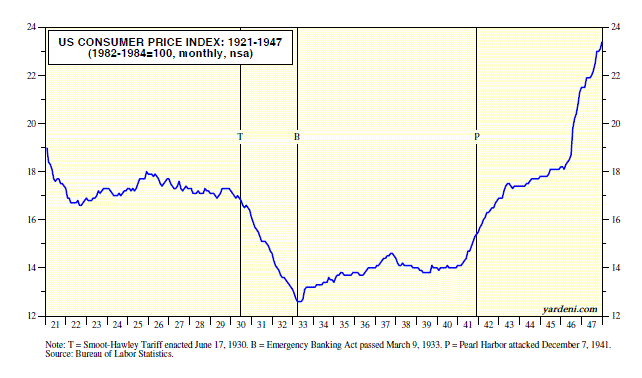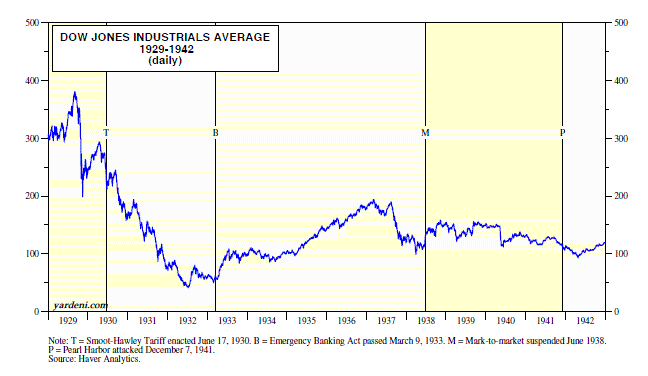
The following is an excerpt from my new book, Predicting the Markets. It seems especially relevant after President Donald Trump raised tariffs on imports of solar panels and washing machines during January, and is planning on raising tariffs on aluminum and steel imports this week:
[T]he 1920s was a period of globalization, with peace, progress, and prosperity. Yet by the early 1930s, the world fell into a depression that was followed by World War II near the end of the decade.
My research led me to conclude that the Great Depression was caused by the Smoot–Hawley Tariff Act of June 1930. During the election of 1928, Republican candidate Herbert Hoover promised US farmers protection from foreign competition to boost depressed farm prices. However, he was appalled by the breadth of the tariff bill that special interest groups had pushed through Congress, denouncing the bill as “vicious, extortionate, and obnoxious.” But he signed it into law under intense political pressure from congressional Republicans.
The tariff triggered a deflationary spiral that had a deadly domino effect. Other countries immediately retaliated by imposing tariffs too. The collapse of world trade pushed commodity prices over a cliff. Exporters and farmers defaulted on their loans, triggering a wave of banking crises. The resulting credit crunch caused industrial production and farm output to plunge and unemployment to soar. In my narrative, the depression caused the stock market crash, not the other way around as is the popular belief. Consider the following grim post-tariff statistics:
(1) Trade. Data compiled by the League of Nations show that imports of 75 countries dropped 55% from June 1930 through March 1933. In the United States, industrial production dropped 41% from June 1930 through March 1933. Historian John Steele Gordon observed that US exports in 1929 were $5.24 billion, whereas by 1933, exports were only $1.68 billion; when inflation is taken into account, the latter amount was less than US exports in 1896. As countries successively raised tariffs, world trade fell by two-thirds from 1929 to 1934. Gordon concludes, “Thus, Smoot–Hawley was one of the prime reasons that a stock market crash and an ordinary recession turned into the calamity of the Great Depression.”
(2) Prices. The producer price index (PPI) for industrial commodity prices plummeted 24% from June 1930 until it bottomed during April 1933. The PPI for grain prices plunged 59% until it bottomed during December 1932. The consumer price index (CPI) fell 25% from June 1930 until it bottomed during the spring of 1933.
(3) Loans and deposits. Commercial bank deposits fell 36% from $43 billion during 1929 to $27 billion during 1933. Deposits frozen at suspended commercial banks rose sharply during the three banking panics from 1930 to 1933.
(4) Unemployment. The unemployment rate for nonfarm employees soared from 5.3% during 1929 to peak at a record high of 37.6% during 1933. Over this same period, it jumped from 3.2% to 25.2% for the civilian labor force, including farm workers.
The Dow Jones Industrial Average (DJIA) plunged 47.9% from its record high of 381 on September 3, 1929 to the year’s low of 199 on November 13. From there, it rebounded 48.0% to 294 on April 17, 1930. It was down only 5.1% on a year-over-year basis, suggesting that the Great Crash wasn’t so great! But the worst was ahead, as the stock market started to anticipate the passage of the tariff bill, despite a letter printed in the May 5, 1930 issue of The New York Times signed by 1,028 economists who opposed the bill. The DJIA proceed to fall by 86.0% from the April 17, 1930 high to the low of 41 on July 8, 1932. That was the Great Crash indeed! (See Appendix 2.1, The Protests of Economists Against the Smoot-Hawley Tariff.)
That’s my explanation of what caused the Great Depression. ... Google) search the “Great Depression” and you’ll find more than 20 million links. Narrow the search to “causes of the Great Depression” and you’ll find more than three million links. In my home office, I have three shelves of books that offer lots of explanations for this economic disaster. Few of them give a starring role to the tariff. Excessive speculation in stocks that set the stage for the Great Crash often gets blamed for starting the mess.

